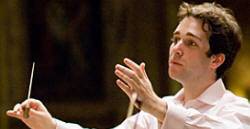 |
 |
Advertise | Sustaining Membership | VAN Store | Feedback
by Nicholas Beard for Vocal Area Network
Posted September 23, 2009
 "Early music is where I live, most of the time," says Steven Fox, the new
music director of the 16-voice women's group Amuse. "It's one of the
reasons we started with a program of Renaissance and medieval repertoire."
Fox, just 30 and a major contender among New York's rising conductors, is
discussing Amuse's inaugural concert of the 2009-10 season, on October 3 at 8 PM
at St. Ignatius of Antioch at 87th Street and West End Avenue. It's his
first at the helm of the seven-year-old group.
"Early music is where I live, most of the time," says Steven Fox, the new
music director of the 16-voice women's group Amuse. "It's one of the
reasons we started with a program of Renaissance and medieval repertoire."
Fox, just 30 and a major contender among New York's rising conductors, is
discussing Amuse's inaugural concert of the 2009-10 season, on October 3 at 8 PM
at St. Ignatius of Antioch at 87th Street and West End Avenue. It's his
first at the helm of the seven-year-old group.
Founded by veteran chorister Lee Ryder in 2002 at St. Michael's Episcopal Church (where Anonymous 4 got its start), Amuse has by now gained a reputation in local choral circles as the crème de la crème among women's chamber ensembles. Most of the members are not singers by profession; no one is paid for her efforts. Programs are generally sung a cappella, as dictated by repertoire. In addition to passing a rigorous audition, singers are required to attend all rehearsals. And, since there are relatively few of them (eight in this case -- they started in earnest on September 12), learning the music on one's own ahead of time is de rigueur. Sight read at your peril.
Save for when he founded his own ensemble in college, Fox has spent most of his career conducting professional musicians. Among his other, current jobs: Artistic Director of the Clarion Music Society, Acting Music Director for Trinity Church Wall Street, Associate and Cover Conductor for the New York City Opera and the Yale Schola Cantorum.
Is there a big difference, working with, you'll pardon the expression, amateurs? "There are a lot of professional quality voices in Amuse," he responds, "but professionals usually come in with timbres that might not, at first, blend so easily. Their ranges are similar of course, but they have developed unique timbres through their training. In this case, the voices are distinctive, but collectively they have locked in very quickly and easily to create a lovely blend."
In other words, no warblers or wobblers. Certainly not for a program of works by Guillaume Dufay, Josquin des Prés, Tomas Luis de Victoria, Hildegard von Bingen, Francisco Guerrero, Ludovico Tommaso da Vittoria, Palestrina, Luca Marenzio and William Byrd (Mass for Three Voices).
"It's very possible that a lot of these pieces would have in fact been sung in the transpositions we're using," says Fox. "Because we don't know specifically what pitches they were working with in the 16th century. If you see a piece by Vittoria that's printed in C Major for SATB, it's very possible that it would have been sung in F Major, with high voices."
Fox's expertise in and enthusiasm for early music, and his determination to bring its lesser-known gems to life, were no small part in what initially brought him to the attention of the board of directors of the Clarion Music Society, of which he's been Artistic Director since 2005. Founded in 1957 by the late Newell Jenkins, a noted conductor and Vivaldi scholar, the group is credited with the modern premieres of no less than 70 works written before 1850, across its relatively sparse, three-concert annual series. But when Jenkins died in 1996, the group pretty much died with him. By 2001 it had ceased performing altogether and instead became a grant-giving foundation for early music projects.
Meanwhile, Fox, a double major in Russian and music, was forming his own Renaissance madrigal group at Dartmouth College. During his junior year, he travelled to St. Petersburg, mostly, he thought, to study the language.
"It was a wild time," he recalls. "It was 1998, right after the ruble had been devalued, so our student budget was great – the dollar was going such a long way. Every night we were at the opera or at the symphony. I was the only music major but everyone else quickly got used to that lifestyle, too. We could get orchestra seats for $3 at the Mariinsky Theater with Gergiev conducting. Can you imagine?"
Inspired by his crash course in Russian musicology, he returned to school and promptly put together his own Russian concert series. After graduation, he says, "I knew I had to find a way back to St. Petersburg." By 2001, barely one year out of college, Fox had established Russia's first-ever period instrument orchestra, Musica Antiqua St. Petersburg. Eager for the group to tour the United States, he began a grant-writing campaign to finance it.
Thus began the Clarion connection. Fox applied for and, in 2003, received, the requisite monies to bring Musica Antiqua to the U.S., all the while working on his Master of Music degree from London's Royal Academy of Music. The first tour a major success, he turned again to Clarion to help fund another Musica Antiqua project – a concert at St. Petersburg's Hermitage, among Russia's oldest and most beloved theaters, built in 1782-85 by Catherine the Great.
It was at that point, knowing his work, admiring his entrepreneurial spirit, that the board of directors realized Fox was the ideal candidate to bring Clarion performances back to life. "When they started the foundation, they also had in mind that the series would return," says Fox now. "They just had to find the right person."
That they have. And so has Amuse.
Nicholas Beard writes about music for a number of publications, including MusicalAmerica.com.